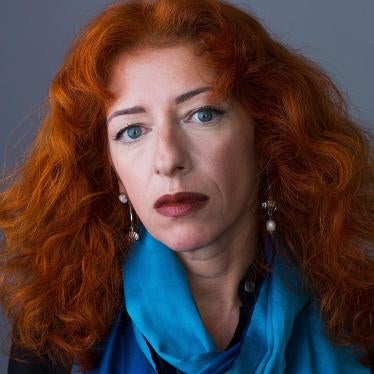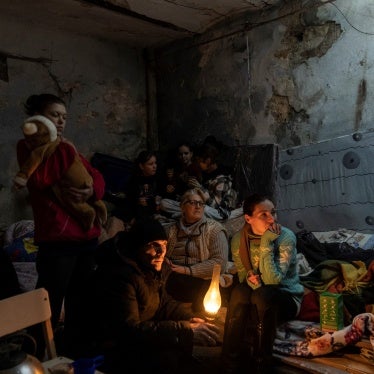Vitaliy Chernov, a school principal from Ukraine’s Kharkiv region, smiles as he pours us tea. A soft-spoken man in his fifties with thick eyeglasses, he seems like someone you’d want to talk books with. Instead, he tells us how Russian troops occupied his village, and what happened when he refused to hand over official school documents to them. At that point, Vitaliy’s story swerves from an account of being an educator, to one of torture and near-death behind bars.
Education in Russian-occupied areas of Ukraine is under attack. According to a new report by Human Rights Watch, “Education under Occupation: Forced Russification of the School System in Occupied Ukrainian Territories,” Russian occupying forces are suppressing the Ukrainian language and curriculum, imposing instead a Russian curriculum, taught in Russian. This violates the laws of armed conflict and international law relating to children’s right to education. Russian authorities and their proxies have threatened parents with fines, loss of custody of their children, and detention if they don’t enroll their children in “Russian” schools, or if their children study the Ukrainian curriculum online. They have also threatened, detained, and tortured Ukraine school workers, like Vitaliy, one of the school workers we interviewed for the report.
Borivske, Vitaliy’s village, has approximately 2,000 residents and is 60 kilometers from Russia’s border. Russian troops entered the village on the first day of the full-scale invasion, February 24, 2022. Vitaliy shut down the village school, sent the staff home, and switched to distance learning. Although Russia was occupying the area, Russian troops only passed through the village and were not stationed there. So, Vitaliy partly reopened the school, letting the students supplement online lessons with in-person support by their teachers.
In June, the head of the village occupation administration contacted Vitaliy and told him that he should prepare to reopen the school fully on September 1, 2022, where the Russian state curriculum would now be taught. Next, the district occupation authorities gathered school workers for a meeting. They said that Russian textbooks and lesson plans were on the way, and the language of instruction would be Russian, with two hours of Ukrainian per week offered as electives. The authorities said school staff could chose to resign but encouraged them to “do the right thing by staying on.” They also asked staff to share lists of workers willing to cooperate.
Vitaliy told his staff he would stay only if they used the Ukrainian curriculum, and suggested everyone do their best to help students finish the school year. By the end of June, he and his colleagues managed to wrap things up, hold exams, and issue completion certificates for students who finished 9th grade.
During the summer break, the head of Borivske occupying administration kept pressuring Vitaliy to sign a new contract. “The children need their education and Russia is here to stay,” he said, according to Vitaliy. “If you and others leave, you will no longer have a job and teachers from Russia will simply be brought here to replace you.”
Vitaliy claimed he was retiring; he was the right age. So, one day, the occupying official told Vitaliy to accompany him to the school, so the official could check that everything was in place, and Vitaliy could then hand over the keys. Vitaliy complied, but by that time, seeking to protect the privacy of his staff and students, he had already removed the teachers’ and students’ records, distributing those he could to their rightful owners and hiding the rest.
He knew that Ig hold of school records likely made it easier for Russian authorities to compel parents to send their children to schools run by occupying authorities.
Over the summer, Vitaliy and his family, including his 18-year-old son, had decided to leave for Ukrainian-controlled territory if Ukrainian troops didn’t manage to retake Borivske by September. On September 2, Vitaliy met with a man who, for a hefty sum, promised to smuggle them out. But when he returned from the meeting, he said, “I saw six men in balaclavas shoving my son into the house.”
Russian security officers ransacked their home, demanding “all the school documents.” Vitaliy said he had left them at the school. They seized his laptop and other electronic devices, searched his car, the garage, and even the apartment building’s basement, forced him into a car, and drove him to Kupiansk, 25 kilometers from Borivske.
In Kupiansk, they handed Vitaliy over to the Russian-appointed occupation police.
They took Vitaliy’s shoelaces, belt, and glasses, and locked him up in cell that had four walls, but had bars instead of a ceiling, leaving it open to the outside. It was already crowded with 10 other detainees.
“I was stuck there for three days,” Vitaliy recalls. “It was boiling hot during the day but the nights were freezing. It also rained on the second night. We did sit-ups and push-ups trying to keep warm, but it was impossible – concrete floor, concrete walls, no beds, no protection from the elements.”
The men took turns sitting on a narrow bench made of plastic water bottles laid on their sides, as the floor was ice cold at night. Occasionally, they would lie on the floor, on their sides, pressing together for warmth, and doze off briefly. One of the detainees had what they believed was an epileptic seizure. When a guard finally showed up, he shrugged, told the others to put the sick man on his side and left. Another man had a bag over his head the whole time, held in place by scotch tape just above his mouth. Yet another was chained to a bar on the wall.
On the third day, Vitaliy was interrogated.
“They put a bag over my head, handcuffed me … took me to a room on the second floor and put metal clips on my [pinkie] fingers,” he said. “I don’t know how many people were in that room but only one did the talking. He repeatedly asked about the missing documents from the school and I pretended I did not know what happened.”
His interrogator then said that Vitaliy would need to give him “some meaningful information” about the documents or at least about people from Borivske, who had spoken against Russia or hidden weapons, if he wanted to go home. “That’s when I was hit with the first jolt of electricity.”
The interrogator then asked Vitaliy about one of his staff who supposedly bad-mouthed the Russian occupying authorities. Vitaliy replied that the woman’s son “was killed in the war.” “Not a war but a special military operation,” corrected the interrogator and gave him another electric shock. This went on for some 30 minutes. Every time Vitaliy’s answers were not to the interrogator’s liking, he was punished by electric shocks. The last shock was the hardest; so powerful and painful that Vitaliy practically fainted. “Unless you start talking, we’ll be giving you these treatments till the end of the special military operation,” the interrogator threatened, and ordered guards to take Vitaliy away.
The guards threw Vitaliy into a cell inside the building. That night and for three more days, he was held with thirteen others, squashed in a small space meant for four. They were fed slop twice a day. The cell was suffocating as its sole window only opened a crack, so the inmates kept the food slot in the door open for a bit of air circulation. If they spoke loudly or laughed, the guards punished them by closing it for several hours.
On his second day in the new cell, Vitaliy was once again interrogated, tortured, and threatened that “If I didn’t cooperate my wife and son would be sitting where I was.”
The next day, at around 10 a.m., he and his cell mates heard a man being dragged into the hallway, chained to something, and brutally beaten. They heard kicks, and punches, and slaps against flesh. The man was screaming … and then he stopped screaming. Vitaliy heard one of the guards mutter, “I think we need an ambulance,” and could hear the man’s body being dragged along the floor.
Without warning, the following evening, the guards shut all the food slots in the cells and locked them from the outside. Soon afterwards, heavy shelling began. The inmates – there were 12 or 13 cells, the smaller ones holding 4 to 6 men and the larger ones up to 19 people – started yelling for the guards, banging on the doors, but no one came. The explosions were deafening.
“Those people, police officers or what do you call them, they just locked us in those cells like cattle ... We were of no danger to them. They could have opened the doors. But they chose to leave us there to die,” Vitaliy said.
The bed frames were welded to the floor but a few men in one of the cells managed to wrench one out, used it to bang on the window bars, and succeeded in bending them enough that one scrawny inmate could squeeze through the opening. He found the keys in the abandoned guards’ room and opened all the cells.
Then, the prisoners broke into different rooms searching for their belongings, documents, shoelaces. “I finally got my glasses back, it was such a relief, I’m awfully nearsighted, and could barely see anything without them …”
At that time, Vitaliy hadn’t realized that the shelling had been part of Ukraine’s counter-offensive to retake the area, and that Russian forces had retreated. He made it home the next day.
Two years later, Russia continues to occupy swaths of territory in Ukraine, where there may be more education workers who, like Vitaliy, are trying to protect the privacy of school records from occupying authorities. For their part, occupying authorities seek to shut off any alternative to learning the Russian curriculum, which is a tool they use to indoctrinate children with the types of Orwellian propaganda that Vitaliy’s interrogator used when he denied that Russia was fighting a war against Ukraine. It’s part of their broader indoctrination narrative, which includes the falsehood that Ukrainian statehood and language do not exist.
This is one aspect of Russia’s full-scale invasion that too few people outside Ukraine understand.









